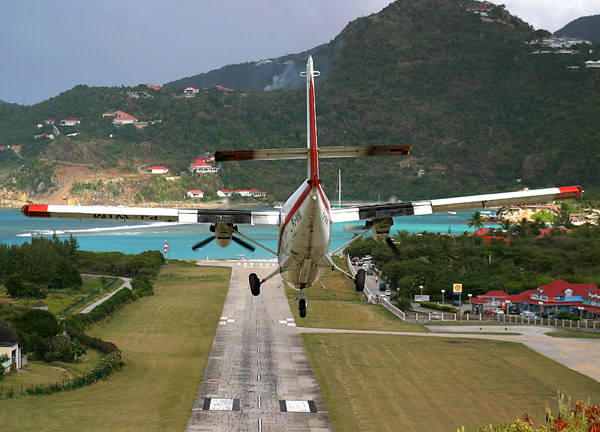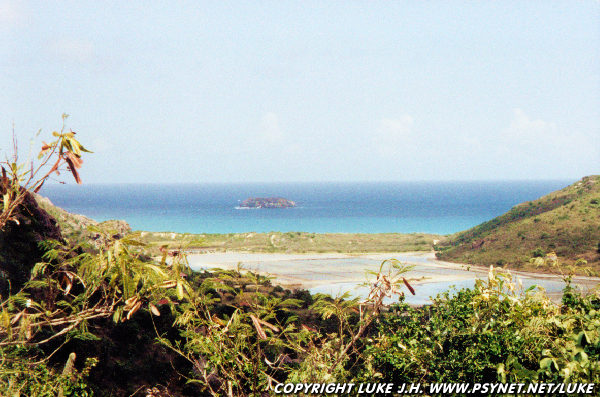
Those with trucks and heavy equipment teamed up with municipal employees to open roads and clear the port and the airfield. In only a few days electricity was restored to much of the island. "In the beginning you felt like crying," Laurence says, her fingertips pushing a nearly empty cigarette pack across to Peter. "We were all working like mad, and it was very dangerous, with bits of roof tile and pieces of metal scattered. But then you felt like laughing and crying at the same time. Everybody was a friend, and every neighbor came to see if everything was OK with you. It was great."
Jean Claude Maille is a veterinarian, born in Monaco and educated in France, who settled in St. Barts after working on a cattle ranch in Paraguay and serving with the French military in Gabon. "It was difficult to stay in France after living in Africa," he says at his clinic in the country at Colombier. "I was looking for a place with a sense of community. And I thought, 'Why not an island?’" Maille spent five days in nearby St. Martin before taking the heart stopping flight to St. Barts, where small planes come in low over a hilltop highway, then swoop like raptors onto a 2,100-foot runway that ends just short of Baie de Saint-Jean.
St. Barth Airport
Copyrighted Image"When I saw St. Barts." Maille recalls, "I wanted to live here. I didn't even know if they have dogs or cats, or if they already have a veterinarian. I go outside the airport in the street, and I say to somebody, 'Do you have a vet here?' He said no. I said, 'You have one now.'" Five years later St. Barts is home, and he's married to an islander. "Compared with the rest of the world, this is paradise," Maille says. "The sunshine, the beautiful beaches, but especially because of the people. Wonderful people, so pure. Yes, pure. And honest. I never close the door of my house. I don't even know where is the key." Islanders who bring him their animals have given Maille glimpses of their lives. "Such hard lives," he says. "Before tourism, you cannot imagine the life."
La Grande Saline & Anse de Grande Saline, Saint Barthelemy, F.W.I.
Image Copyright © LukeTravels.com™"Dure," says Louis "Pompi" Ledee. Hard, harsh, obdurate. "Trop, trop dure." We're talking at Chez Pompi, his hilltop restaurant-cure-gallery in the community called Petit Cul de Sac. "My family is very poor, and I had to help them when I was a small boy," says the native chef-cure-artist. Several years after he and his wife opened their restaurant, L6d6e tells me, he had an unusual night. "I sleep, I see picture in my head, I don't know what is happening to me! I put that picture on paper with a crayon," Ledee recalls, "and then I made another, and I put them in the restaurant.
Then two Americans come in, and they fight to buy those two pictures. I say, 'Well, I don't know the price; well, if you want to, give me $20.'"
That was in 1988; since then, his work is sold almost before the paint is dry, and his prices have risen. Paper and 'crayons have yielded to canvas and oils.
His bright naive paintings depict the folk life of his youth - fishing boats, musicians at a fete, country dances or fantasies in color. Art has improved Ledee’s life, but he's not giving up the restaurant yet. "If people don't want to look, they can always eat."Vous Mangez Tout! You eat everything!" commands the proud proprietor of an open-air restaurant on Gustavia's harbor front, dashing from behind his counter as I make my way through an enormous curried chicken salad. In the restaurant a tape plays reggae: "Why should black heroes die so soon?" the singer asks, At these tables no one's complexion is much darker than a yacht club tan. I gulp a glass of bottled water and dedicate myself to my excellent salad. In fact, the absence of black faces and the presence of bottled water are related.
The history of St. Barts has been shaped by its lack of water. Drinking water, like nearly all food items, comes from abroad by ship (a handwritten notice posted in my hotel bathroom warns guests not to use tap water for tooth brushing. Bottled water is available from room service for about eight dollars a liter, but I'm relieved to find it at nearby cubbyhole grocery stores for a quarter of that price). A small desalinization plant provides most of the rest of the island's water.






